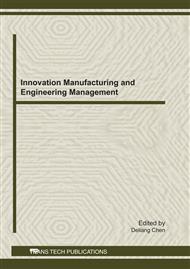p.192
p.197
p.201
p.207
p.213
p.217
p.222
p.229
p.234
Study on Information Truth-Telling in Manufacturing Supply Chain
Abstract:
This paper presents a three-stage game model between one manufacture and n retailers. If the retailers share their forecasts truthfully, the manufacturer always benefits; On the other hand, the profits of the retailers always worse off by disclosing their demand information to the manufacturer. The information distortion phenomenon is the direct result of each party exploiting its private information to appropriate the gains from information sharing. If the manufacturer and the retailers can agree on their relative profit margins or profits prior to information sharing, the retailers will share their information truthfully and both parties may benefit from information sharing.
Info:
Periodical:
Pages:
213-216
DOI:
Citation:
Online since:
August 2011
Authors:
Keywords:
Price:
Сopyright:
© 2011 Trans Tech Publications Ltd. All Rights Reserved
Share:
Citation:


